
by: SEO Strategist
Ashot Nanayan
Ashot Nanayan is the CEO and Founder of DWI and a seasoned SEO strategist. With a proven track record of...
All Articles by Ashot Nanayan
July 31, 2025
7 min. read
Every year, the demand for professions that allow you to be independent, work remotely from home, and travel as much as you want is growing.
While many are focused on professions where competition has already reached its peak, this is a great opportunity to learn a new profession that few people talk about, but where there are more opportunities, more room for growth, and more money.
In this guide, I’m going to talk about steps, tips, and opportunities to become a link-building specialist and earn thousands of dollars like I did in my freelancing career. You’ll also learn about salary expectations, compare free vs paid courses, and get tips to create your portfolio. Ready? Let’s dive in.
A link-building specialist is someone who helps websites get links from other websites. Backlinks are important because they show search engines like Google that your site is trustworthy and worth ranking higher. The more high-quality and relevant links you have pointing to your site, the better your chances of appearing on the first page of search results.
A good link-building specialist finds websites that make sense for the topic and builds real connections. That could mean writing guest posts, answering expert questions for news sites, or suggesting helpful content to bloggers who are already talking about a related subject. It’s a mix of research, communication, and strategy.

They also keep an eye on competitors to see where they’re getting links from, and use different SEO tools to track what’s working and what’s not. It’s part technical, part creative.
A big part of the job is backlink outreach, reaching out to people and asking for links in a helpful way.
In short, a link-building specialist helps websites get noticed by the right people (and search engines) through smart, honest white hat link-building strategies.
The demand for skilled link-building specialists continues to grow in 2025, especially as more businesses realize that backlinks are still one of the most important SEO factors.
As of 2025, entry-level link-building specialists typically earn between $35,000 to $55,000 per year, depending on location and whether they work in-house, at an agency, or freelance.
Mid-level specialists with a few years of experience often make $60,000 to $80,000, especially if they can show a track record of delivering strong results. Senior professionals or those offering specialized services like digital PR or enterprise link-building can command $90,000 to well over $120,000 annually.

Freelancers and consultants charge anywhere from $30 to $150+ per hour, depending on niche, reputation, and deliverables. Those who run their own link-building services or agencies can scale earnings far beyond that.
In my opinion, the outlook for this role is strong because link-building still requires human strategy, relationship-building, and good judgment, skills that aren’t easily automated. If you’re good at research, communication, and thinking long-term, it’s a career path with real growth and great income potential.
Here’s a table showing estimated link-building specialist salaries by country in 2025, based on industry trends, job board data, and freelance marketplace averages. These figures reflect full-time, in-house roles and can vary based on experience, location (city vs rural), and company size.
| Country | Entry-Level Salary (USD) | Mid-Level Salary (USD) | Senior-Level Salary (USD) |
|---|---|---|---|
| United States | $40,000 – $55,000 | $60,000 – $80,000 | $90,000 – $120,000+ |
| United Kingdom | £25,000 – £35,000 | £40,000 – £60,000 | £70,000 – £90,000+ |
| Canada | CAD 45,000 – 60,000 | CAD 65,000 – 85,000 | CAD 90,000 – 110,000+ |
| Germany | €35,000 – €45,000 | €50,000 – €70,000 | €75,000 – €90,000+ |
| India | ₹400,000 – ₹600,000 | ₹700,000 – ₹1,200,000 | ₹1,500,000 – ₹2,500,000+ |
If you’re serious about link-building, the first thing you need to understand is how search engines (Google, Yahoo, Bing, etc) work. You should know how Google ranks pages, what quality content looks like, how links help rankings, and what “relevance” means in various situations.
You don’t need to know every little algorithm detail, but you should understand the basics well enough to explain them to someone else. Things like on-page SEO, search intent, Google’s guidelines, and crawlability; all of that matters.
You need patience. You’ll spend hours sending emails, and most of them will be ignored. That’s normal. You need persistence, too, because getting one good link might take a week. If you give up fast, this isn’t the right job. You also need to be curious. You should enjoy analyzing competitor backlinks, asking “How did they get this link?” and figuring it out.
When I was working as an in-house SEO expert at an agency, believe me, 8 out of 10 SEOs hated link-building. Not because it’s boring or repetitive. It’s because link-building isn’t for every mind. So, be patient, look around, and develop the skills others ignore.
I’ve made a lot of money on various freelancer platforms, offering link-building and other SEO services. But trust me, my journey wasn’t smooth. I failed many times, sent emails that never got answered, and learned most things the hard way. Over the years, I’ve worked with all kinds of companies, from B2B and SaaS startups to big enterprise clients.
If you want results like that or even better, stick with me. I’m going to show you exactly how I did it, based on personal experience.
When I say “Google’s guidelines,” I’m talking about the rulebook Google doesn’t want you to ignore. I mean the overall concept of how Google expects you to behave if you want to rank. Things like avoiding manipulative link schemes, not using doorway pages, and focusing on helpful content that earns links naturally. You must clearly imagine how Google sees the web, how it evaluates trust, and what it rewards in the long run.
Many people try to jump straight into link-building without knowing a thing about how search engines read a page or why content structure matters.
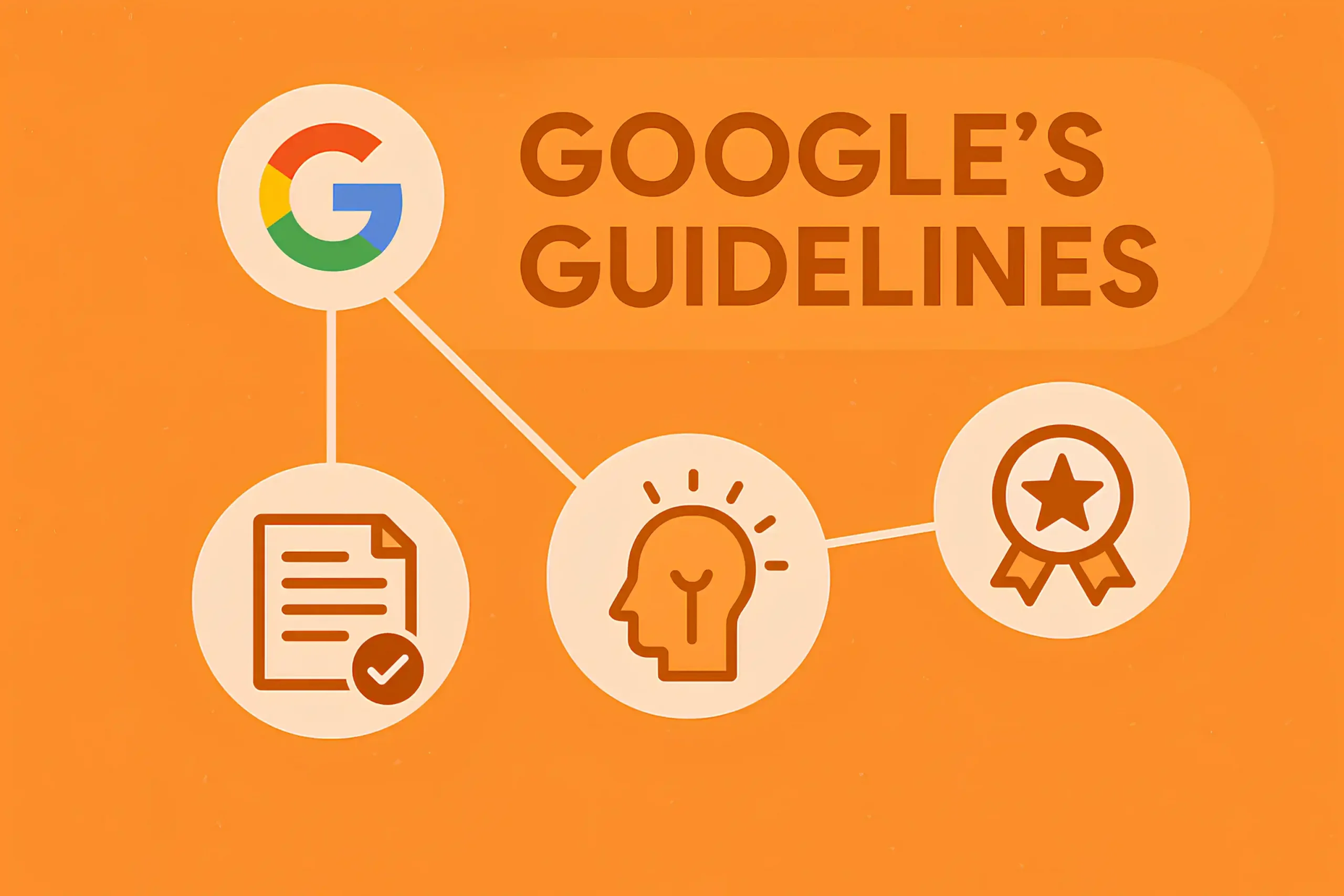
If you really want to become a top-tier link-building specialist who gets consistent, clean results across industries, keep this #1 step in mind.
If you’re new to all this and want to start with the right foundation, you can join our beginner SEO course. It covers everything you need to know before you get into link-building. Simple, clear, and made for people who want to learn.
If money’s tight and you can’t pay for a course right now, that’s okay. You can still learn everything you need if you’re willing to put in the time. When I started, I had nothing: no budget, no mentor, just a cheap laptop and late nights. But I made it work by digging into every free resource I could find, and you can too.
Start with Ahrefs’ free SEO course. They break things down in simple language, and it’s taught by people who do SEO for a living. You’ll find it on ahrefs.com/academy.
If you’re into structure, head over to Semrush Academy. Both have free beginner SEO courses with quizzes and clear step-by-step lessons. They’re not too advanced, but they’ll help you get a picture of the basics.
Once you learn the SEO basics, you have two paths: One is the DIY route, cheap or free. The other is hands-on, structured training with real feedback.
First, the budget-friendly option. Platforms like Udemy offer many SEO and link-building courses. Most of them look pricey at first glance; $100, $150, sometimes more. However, if you visit the course page and leave without buying, Udemy will likely run retargeting ads to bring you back, often offering the same course for $10 to $15.
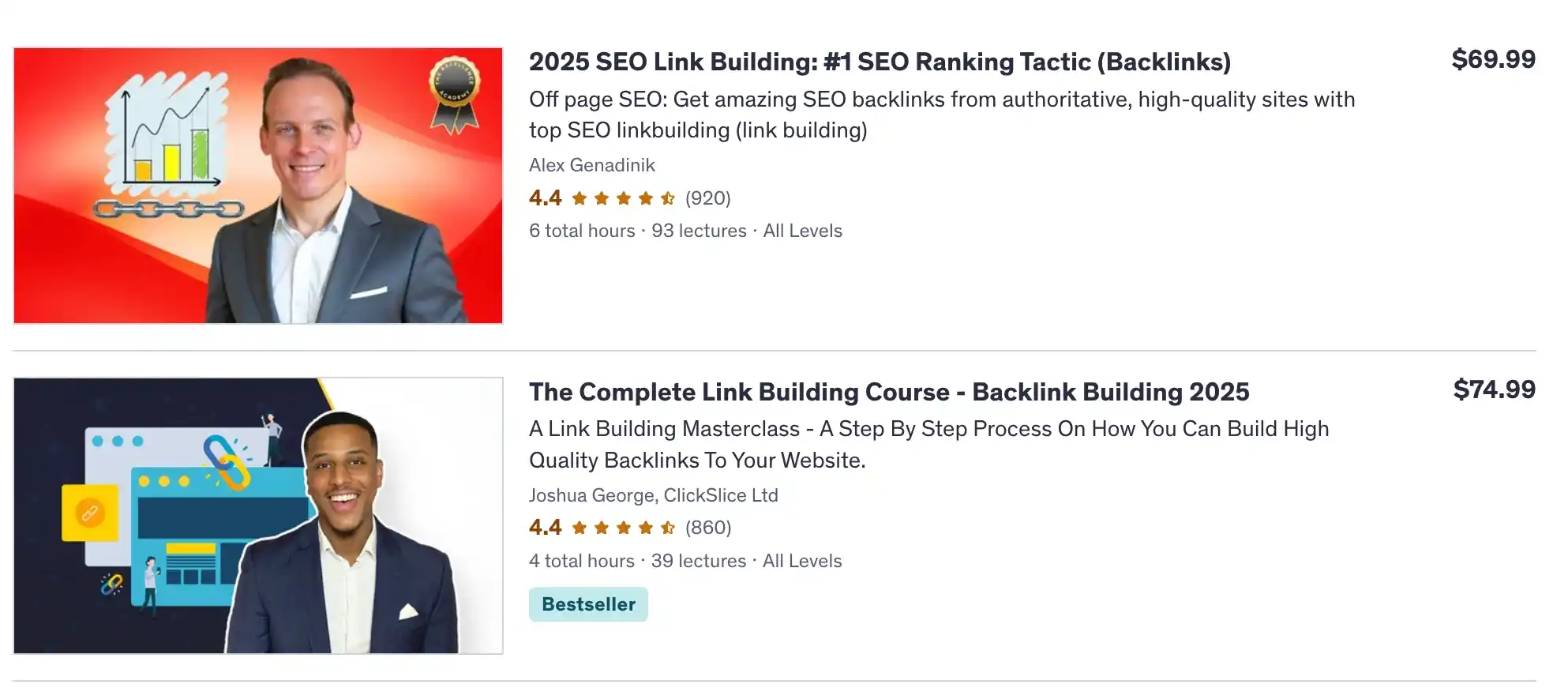
If you’re looking for something 100% free, YouTube is loaded with link-building content, but you’ll need to know what to search for. Ahrefs has excellent free video courses that go way deeper than people expect.
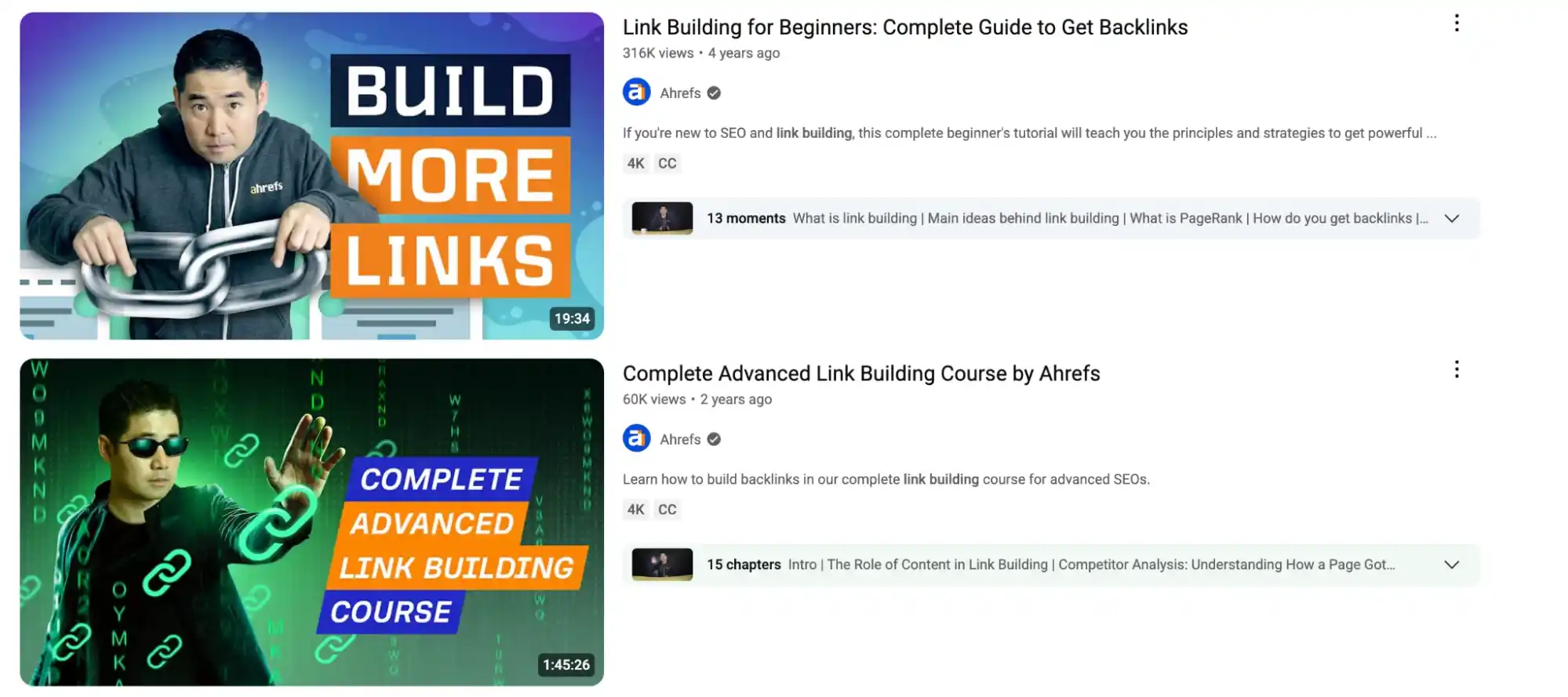
Same goes for Semrush’s YouTube channel. You can also read in-depth blog posts and even use ChatGPT to build your own learning roadmap. Just ask it to create a link-building playbook for you, and you’ll get an outline of strategies to learn, outreach types to explore, and what topics to search for on Google or YouTube.
However, most of this is theory. You’ll watch, read, maybe even take notes, but you won’t do.
If you want to learn link-building in a way that sticks, the best thing you can do is join a live, hands-on link-building course. That’s exactly what we offer at Digital World Institute. It’s not a pre-recorded course. It’s a live course taught over Zoom, and I run every single session myself.
I’ve spent years building links for startups, enterprise companies, and everything in between. Inside the course, you’ll get clear instructions, real tasks, and live feedback; everything I wish I had when I was starting out.
From my own experience, one of the best things you can do when starting in link-building or SEO in general is to get an internship or a junior role.
If you have the option, always go for an SEO agency. Not a general digital marketing agency, and definitely not a random company where you’ll be the only SEO person. When you’re just starting, you will make mistakes. You will have questions, and without the right people around you, it’s hard to know if you’re making smart decisions or just guessing.

In an SEO agency, you’re surrounded by people who’ve seen hundreds of different sites, strategies, client problems, and weird Google updates. If you’re stuck deciding which outreach method to use, how to spend a limited link-building budget, or which pages to build links to first, you can just ask someone who’s done it.
So if you’re serious about growing fast, start looking for real opportunities in agencies. You’ll find junior roles listed all the time on LinkedIn, Indeed, and even Upwork.
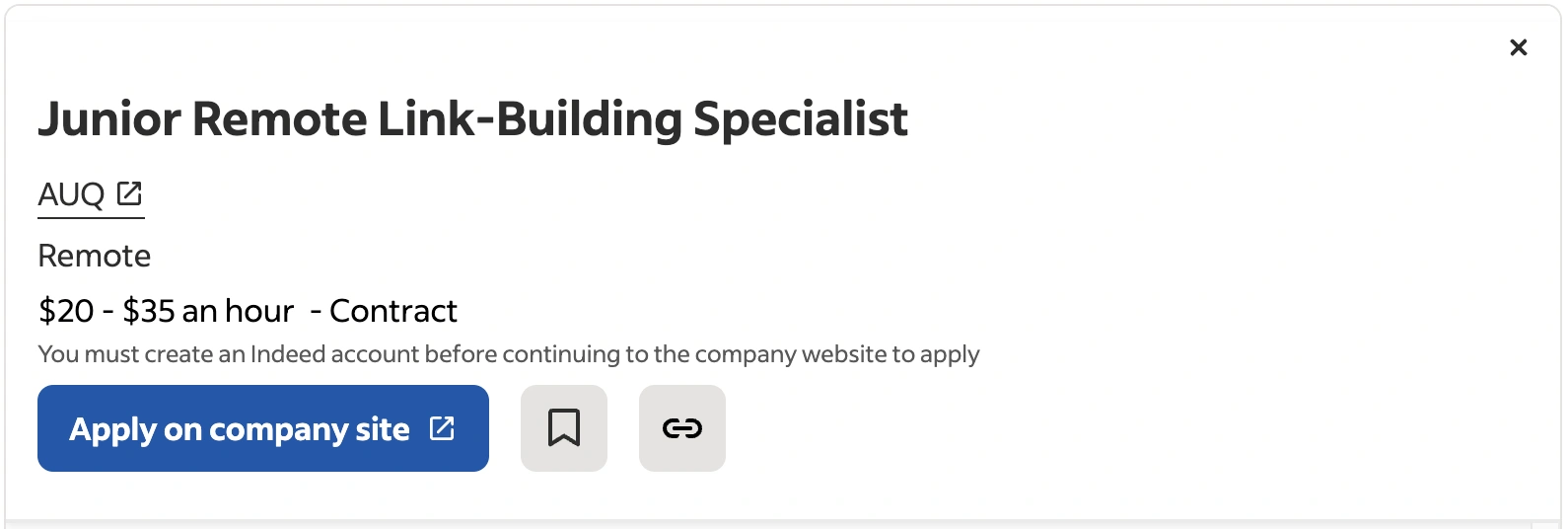
Many openings that say things like “SEO Assistant,” “Junior Link Builder,” or “Outreach Specialist.” Don’t get distracted by the title. Don’t worry about the starting salary. Forget about comfort. Your priority should be learning how link-building works off paper.
If you go through our course and earn the certification, we actively recruit some of the best students into our own team. We’re always looking for smart, curious link builders who want to get their hands dirty and improve. So, whether you land your first job through LinkedIn or with us, just focus on getting your foot in the right door.
Once you’ve got a junior role, or even while you’re still trying to get one, don’t just sit there. If you want to grow, you have to keep looking around. What I mean is, keep your eyes open. Watch what others are doing. Pay attention to the link-building strategies that work.
There are tons of advanced link-building methods out there, and not all of them are beginner-friendly. Techniques like digital PR, or HARO link-building, take time to understand.
But even if you’re not running those campaigns yet, you should still be learning how they work. Read about them. Study the process. Try to understand how pros plan, pitch, and execute these campaigns.
Please, don’t just read blog posts that feel like they were written to rank on Google. Look for actual link-building case studies. I’m talking about breakdowns where someone shows what they tried, what worked, what didn’t, and why.
The failures are just as important as the wins. Sometimes more. You’ll start noticing patterns, like when a campaign failed because the on-page content wasn’t strong enough, or the page they built links to didn’t match the intent.
Try to connect with real people. There are amazing Slack groups, Twitter threads, private SEO communities, and even subreddits where people openly share ideas and tactics. Follow link-building experts on LinkedIn, too. I do that every day.
Here are some of the best SEO communities where you can learn, share, and network:
| Community Name | Platform | What It Offers | Ideal For |
|---|---|---|---|
| Traffic Think Tank | Private Slack Group | Premium community with expert training, live sessions, and Q&As | Advanced SEOs & growth marketers |
| SEO Signals Lab | Facebook Group | Active discussions, case studies, tips, and experiments | Beginners to intermediate SEOs |
| Ahrefs Insider | Facebook Group | Tips and discussions specifically around Ahrefs & SEO strategy | Ahrefs users & tool-focused marketers |
| Measure School Community | YouTube / Slack | Focused on SEO analytics, GTM, and tracking strategies | Data-driven marketers & analysts |
| Moz Community | Forum & Blog | Classic SEO Q&A platform with insights from top contributors | Beginners & intermediate learners |
My journey into link-building and SEO wasn’t simple. It never is. There were a lot of moments when things just didn’t work out. I applied for jobs and heard nothing back. I messaged agencies and never got a reply. So yeah, nothing meaningful gets built in a day.
Sometimes, no matter how hard you’re trying to get your first junior role, it just doesn’t happen right away. Believe me, that’s okay. It doesn’t mean you should sit and wait. What you can do during that time is start building something on your own.
You can go to websites, check their backlink profile using free tools, and spot obvious gaps. Low-quality links, no authority domains, and poor anchor distribution. Then I’d email the owner, something simple and honest:
“I looked at your backlink profile and saw a few ways it could be stronger. I’m learning link-building right now and would love to help out, either for free or for a small fee just to cover my time.”
If they say yes, great. Get to work. Focus on getting just a few relevant links, and if they’re happy with the results, then you can talk about charging.
You can also buy a LinkedIn Premium plan and start messaging SaaS founders, B2B owners, or small business teams directly. I looked for people who clearly had a product but didn’t seem to have a strong SEO foundation.
That worked well, especially with SaaS and tech startups, where founders are always looking for help with backlinks but often don’t have someone in-house yet.
If you ever thought about freelancing as a way to build your link-building career, that’s really great, but you should consider a few important nuances. Personally, my entire career changed when I signed up on Upwork about four or five years ago. It wasn’t easy, not at all.
I started from zero, had no reviews, no feedback, and no trust from clients. But over time, I built real experience, partnered with reliable clients, and eventually passed the $100,000 earned milestone.

I’m not saying that’s some huge number, but the relationships, the network, and the long-term value I’ve gotten from the platform have been priceless.
Today, I mostly work through my SEO agency and offer services under my company’s name. But Upwork is still one of the best platforms out there, especially when it comes to client quality, secure payments, and long-term work.
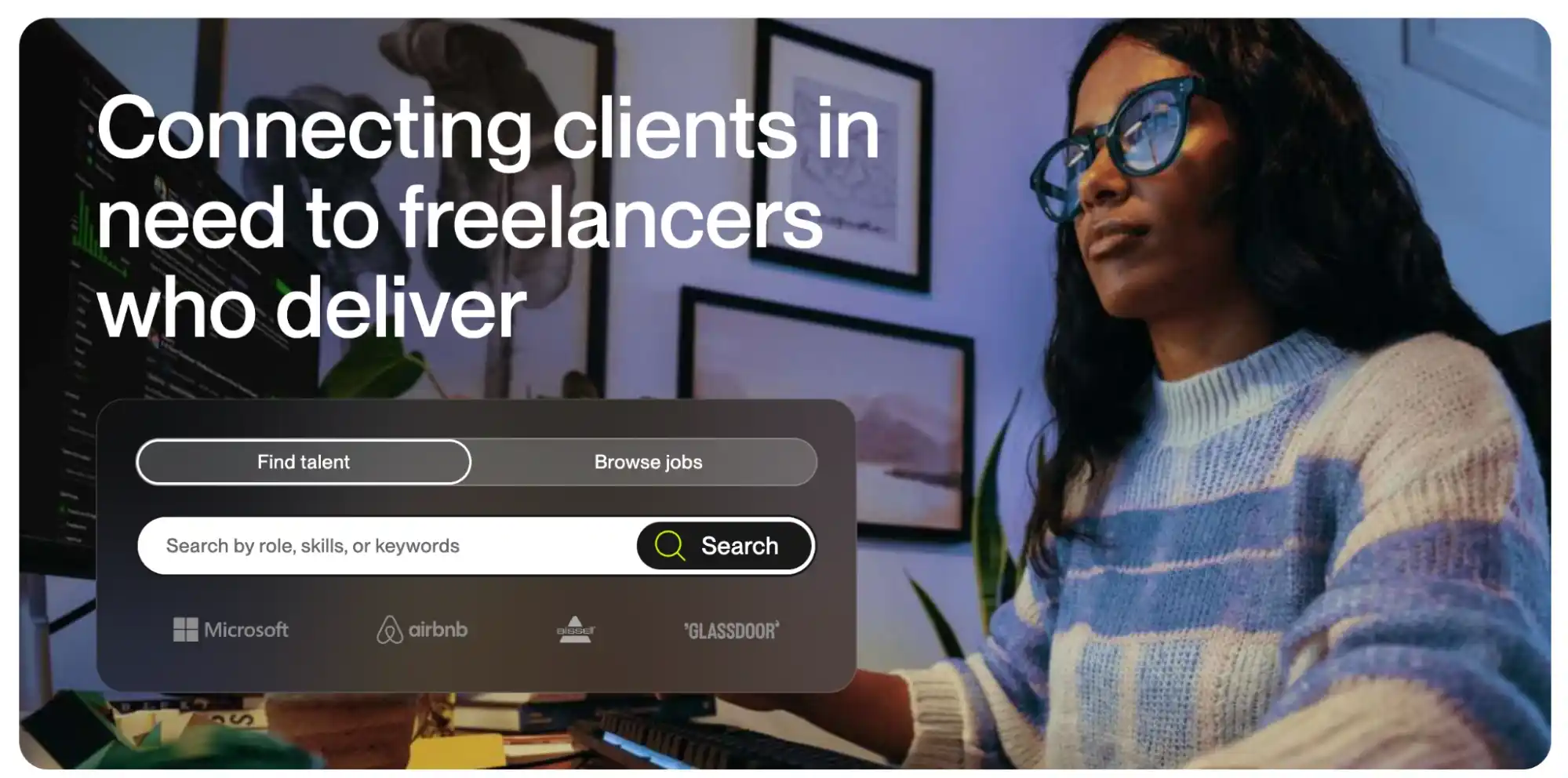
Here’s what I’d suggest if you’re just getting started:
First, take your time and customize your profile. Don’t just say “Link Builder” or “SEO Specialist.” That’s too broad. Go specific. Are you doing link-building for SaaS companies? Or maybe enterprise outreach campaigns? Maybe local SEO backlinks? Pick one angle! Clients love specialists; they don’t want someone who’s “kind of” good at everything.
Second, in your profile description, be honest about your approach. Let them know you don’t do PBNs, link farms, or anything like that. Make it clear that you focus on clean, white-hat strategies: outreach, niche edits, digital PR, whatever your strength is.
Yes, it’s hard to get your first job. Everyone struggles at first. But if you send thoughtful proposals, show you’ve read their job post, and speak like a real human (not a copy-paste ChatGPT proposal), you’ll start getting replies.
Once you get that first client and do a great job, don’t forget about me (haha).
If you’ve never worked on real SEO projects before, I’d honestly suggest finding a job at an agency or under a senior SEO first. Even six months to a year of working with someone experienced will give you more confidence, structure, and clarity. Then, once you know what you’re doing, once you’ve got real skills and results, you can go freelance and take control of your time.
Also, don’t quit your job to freelance unless you’ve saved something up. Freelancing comes with empty months. It’s unpredictable at the start.
So yeah, freelancing can be a game-changer, but it’s only going to work if you treat it like a real job.
It’s a little bit hard, especially if you were only responsible for the link-building side and not involved in the full SEO picture. Some people try to highlight growth in metrics like Ahrefs DR or Moz DA, but to be honest, those are third-party numbers and don’t always reflect real success or business impact. So relying on those alone can feel a bit empty.

Instead, your portfolio should focus on what you did. Break it down clearly. Show real examples of the backlinks you built: mention the target URL, the anchor text used, the title of the linking page, and the actual link. You can organize this in a simple Google Sheet or document with screenshots and direct URLs.
If you used different techniques, like guest posting, niche edits, resource page outreach, HARO, or anything else, make that part of the story. Mention the strategy, the budget, the industry, and what made the outreach or tactic work in that specific case.
If the campaign resulted in something positive, like a traffic increase, higher rankings for the target keyword, or even just improved crawl rates, include that too. Even small wins count. But if you don’t have access to performance data (which is common if you’re only hired for links), then just be honest and focus on showing the quality and relevance of the links.
You can also write a short case study-style summary for each campaign. Nothing long, just a paragraph or two explaining the background, what you did, and how it went.
I would say the answer depends on where you are in your journey and what kind of work style fits you best. If you’re just starting, working at an SEO agency is a better choice. You get exposed to real projects, learn from experienced people, and get a front-row seat to strategies that work.
More importantly, you get feedback. When you’re new, that’s the most valuable thing. You’ll make mistakes, but inside an agency, someone can catch them before they turn into bigger problems.
Freelancing, on the other hand, gives you more freedom, but it also comes with way more responsibility. You have to manage clients, pitch your services, deal with work scope, and constantly prove your value.
If you haven’t done link-building before, trying to freelance too early is not a good choice. Clients expect results, not learning curves. So freelancing makes the most sense after you’ve had at least 6–12 months of solid, hands-on experience working under someone else.
Honestly, certifications aren’t the thing that gets you hired; your experience is. Most clients or agencies don’t care if you’ve passed some course or have a good-looking badge on your profile. What they care about is whether you’ve done the work, understand what you’re doing, and can show real examples of links you’ve built.

That said, going through a course can still be helpful, not because of the certificate, but because of what you learn. Don’t expect a certificate alone to open doors. Instead, focus on building a small portfolio, even if it’s from personal projects or volunteer work. More than anything, what helps is your willingness to learn, test, and improve.
If you’re doing audits, backlink analysis, or consulting, charging hourly is perfectly fine. It is often one-time or short-term, and is based on your time, not deliverables. Just make sure you clearly explain what’s included, like competitor analysis, link gap insights, anchor text review, etc.
For the execution part, most of the industry charges per secured link. That means the client only pays when a link goes live. The SEO retainer model is clean, straightforward, and fair for both sides. The price per link usually depends on factors like the domain authority, niche relevance, traffic of the linking site, and how the link is placed (guest post, niche edit, HARO, etc.).

For example, a contextual link on a DR 50+ blog in the tech space will cost more than a general directory listing or a low-traffic blog.
You can also adjust pricing depending on whether you’re writing the content, doing manual outreach, or including placements only. Some clients prefer full-service, others just want placements. In any case, just be transparent, show examples of what they can expect, and don’t sell cheap links.
Yes, the link-building job market is competitive. The real issue isn’t a lack of jobs; it’s that there are far too many people calling themselves “experts” without knowing what they’re doing. That’s caused a mess in the industry, especially in countries like India, Pakistan, and Bangladesh.
These regions are flooded with cheap sellers offering low-quality links from link farms, free guest posting sites, or sites that exist just to sell backlinks. Unfortunately, a lot of clients can’t tell the difference, so they hire based on price.
This has made it harder for real link-building professionals, people who understand how to evaluate link quality, analyze relevance, and use advanced strategies beyond just buying links in bulk.
Yes, absolutely! You can build a full-time income offering link-building services alone. I did exactly that. For years, I focused purely on link-building, and it not only paid my bills but also helped me build long-term relationships, get bigger clients, and eventually grow my SEO agency. So yes, it’s real.
I’m sure Ahrefs’ $129 monthly plan is more than enough to cover pretty much everything you need in the beginning. It gives you access to backlink profiles, competitor link data, anchor text analysis, content gaps, and keyword tracking in general.
I have been personally using Ahrefs for years as my main tool, and it still does 80% of the job when it comes to building smart, targeted link-building campaigns.
You don’t need to spend money on things like email outreach tools, CRMs, or PR platforms right away. You can handle most of that with Gmail, Google Sheets, and maybe a basic Google extension like Hunter.
Right now, PR-style link-building is in very high demand. Companies are tired of spammy, low-quality backlinks, and they’re starting to understand that earning links from high-authority websites, like news outlets or well-known blogs, is what they need.
No, you don’t need a personal website to start offering link-building services, but it definitely helps in the long run.